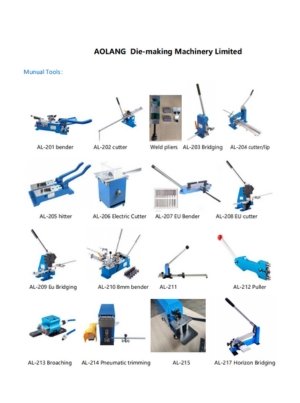Most daily frequently use manual rule bending machine Model: AL-205
If you ask a die-maker, with so many manual tools for die making, what is the most used tool on a daily basis? It must be this forward and reverse manual hitter.
- Simple structure, for auxiliary use only
- Recommended for use with fully automatic bending machines or manual steel rule bender.
- High precision machining to ensure perpendicularity and hitting accuracy
- Double gantry milling processes, quality assurance
- More than 2,000 die-maker users in the market
- Datasheet
| Manual rule bending machine | |
| Model | AL-205 |
| Supported Rule Thickness | 0.45-0.71-1.05-1.42mm(1pt 2pt 3pt 4pt) |
| Supported Rule Height | 6-32mm(common size like 8,22.3,23.0,23.8mm) |
| Standard function | Steel rule hitting( bending ) |
| Tools Quantity(molds) | 4 pcs |
| Machine Size | 760x230x110mm *2 |
| Package Size | 790×260×200mm *2 |
| Net Weight | 36KG *2 |
| Gross Weight | 45KG *2 |
| Installation Method | Screwed to workbench |
Frequently Asked Question
What is difference between manual steel rule bender with this manual hitter?
It seems that the manual steel rule bender and this manual steel rule hitter are both used to bend and form die blades, the function is the same so why do I need to buy these manual hitters?
Although both tools are used for die blade bending, the manual rule bending machine(rule hitter) is mainly used for auxiliary use.
On the one hand, the rule hitter is used to assist the automatic bending machine repair or correct the radian and angle, mainly to correct the angle. Because the intensity of the hitter is larger and the mold design is more sharp than can make the angle or radian be corrected very quickly.
On the other hand, the rule hitter is mainly used for pre-processing before you use the manual steel rule bending machine. Main purpose is to impact and position the angle bending points. If you want to bend a 90 degree (or other degree) right angle precisely at a certain position on the die blade, you need to use the rule hitter first. You can use the rule hitter to hit a V-groove at that position first on the die blade, and then bend along that V-groove (in the manual bender or manually). Makes it easier to shape the angle at that location. Thus making your steel rule bending manual work easier.












